Ho Quang Loi: The path of journalism, the path of culture - Part 1: Green sprouts on a miserable childhood
(Baonghean.vn) - Journalist Ho Quang Loi, a famous journalist, has won 9 National and National Press Awards, has made many outstanding contributions to the journalism and cultural career, and has long been admired for the cultural quality in his current commentary articles. The following series of research articles by Major General, Journalist, Writer Nguyen Hong Thai - Editor-in-Chief of the People's Police Magazine (Ministry of Public Security) was completed in August 2021, but Journalist Ho Quang Loi requested to publish them only after he completed his term as Permanent Vice President of the Vietnam Journalists Association. We respectfully introduce them to our readers.
Nowadays, wherever people meet journalist Ho Quang Loi, they all have the same feeling: he has a very nice name, is over 60 years old but has a quick demeanor, a graceful figure, dresses neatly and politely, a smile spreads across his friendly face, and his speeches and statements are often well-expressed and fresh. It would not be an exaggeration for someone to secretly think that Ho Quang Loi is the type of person who is "elegant inside, gallant outside". As for his works, there is a huge volume of published books, yet reading thousands of his articles is always fascinating, because of his honest approach to problems, sharp arguments, lively writing style and "unprecedented" rich imagery.
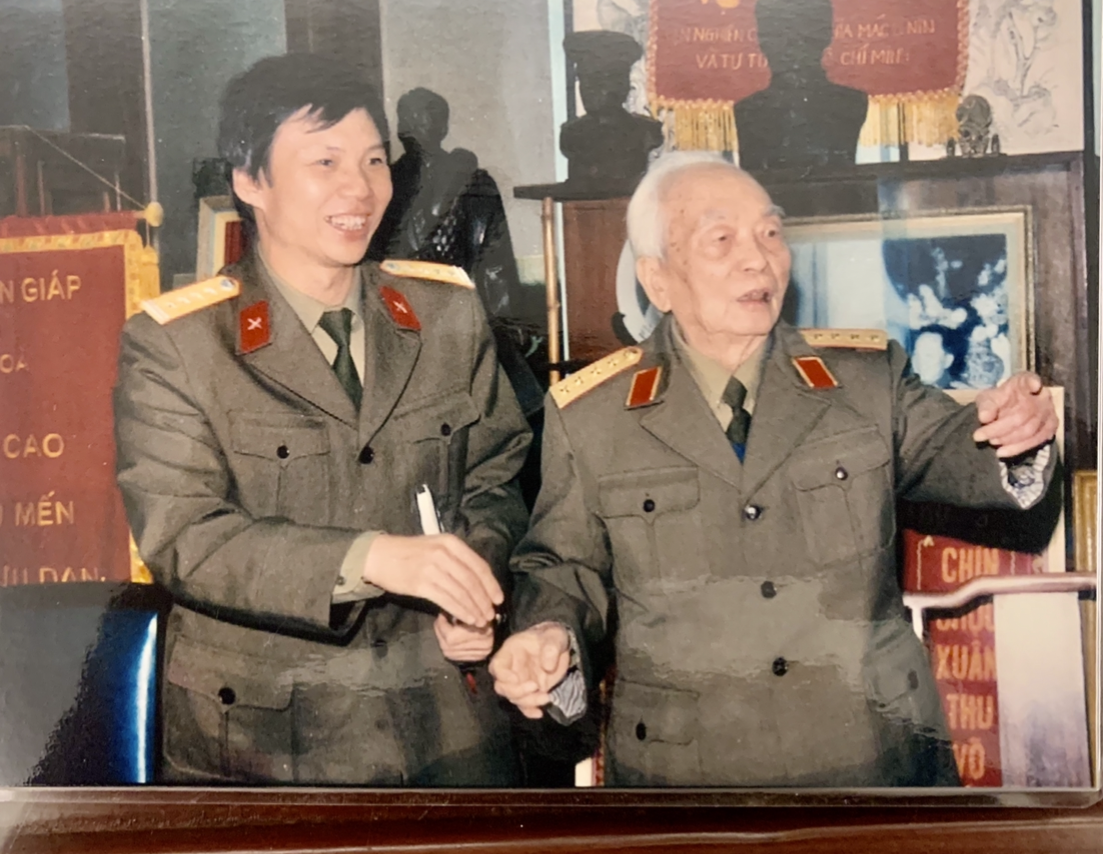 |
| Journalist Ho Quang Loi once worked with General Vo Nguyen Giap |
He is the Permanent Vice President of the Vietnam Journalists Association, former Deputy Editor-in-Chief of the People's Army Newspaper, Editor-in-Chief of the Hanoi Moi Newspaper, Member of the Standing Committee - Head of the Hanoi Party Committee's Propaganda Department, General Secretary of the ASEAN Journalists Federation... With his professional prestige and social influence, he is often invited to participate in many prestigious councils, including a Member of the National Council on Education and Human Resources Development chaired by the Prime Minister himself, an Expert of the Hanoi Institute for Socio-Economic Development Studies, Member of the Bui Xuan Phai Award Council - For the Love of Hanoi, Vice President of the Hanoi City Science Advisory Council for the major project of the 1000-year Thang Long - Hanoi Bookcase chaired by Professor Vu Khieu, Permanent Vice President of the National Press Awards Council, Chairman of the Jury of many specialized national press awards... It feels like Ho Quang Loi is from a noble lineage or was born and trained in a family of great intellectuals. the best in the capital?
Actually, Ho Quang Loi was born in Quynh Doi commune, Quynh Luu district, Nghe An province, in the famous historical Ho family. That is a rural area with a rare tradition of learning and passing exams in Nghe An and the whole country. I have been back to Quynh Doi Cultural Village a few times, famous for its high academic achievements from the feudal period to our current regime. Standing silently for hours in front of the Ho Quynh Doi Family Temple - a National Historical and Cultural Relic - I wondered what was different about this land, what outstanding "feng shui" it had compared to many other Vietnamese villages that made it the birthplace of such figures as Ho Thom (Emperor Quang Trung), poetess Ho Xuan Huong - Queen of Nom poetry, Ho Sy Tao (who helped Mr. Nguyen Sinh Sac enter the Hue National School), Ho Hoc Lam (a revolutionary and patriotic scholar who worked in China), Ho Tung Mau (a revolutionary who worked with Uncle Ho in China), Hero Cu Chinh Lan, Poet Hoang Trung Thong, Poet Tu Mo (Ho Trong Hieu) and hundreds of other famous literati, writers, journalists, and scientists?
I would also like to add that on the large stone stele in the Ho Quynh Doi family temple, the outstanding celebrities who brought glory to the Ho family are engraved: the founder Ho Hung Dat, the founder of the Ho family in Vietnam; the Holy Emperor Ho Quy Ly, a great reformer in Vietnamese history; Emperor Quang Trung - Nguyen Hue (Ho Thom), a military genius; Le Duan (of the Ho family), General Secretary of the Communist Party of Vietnam.
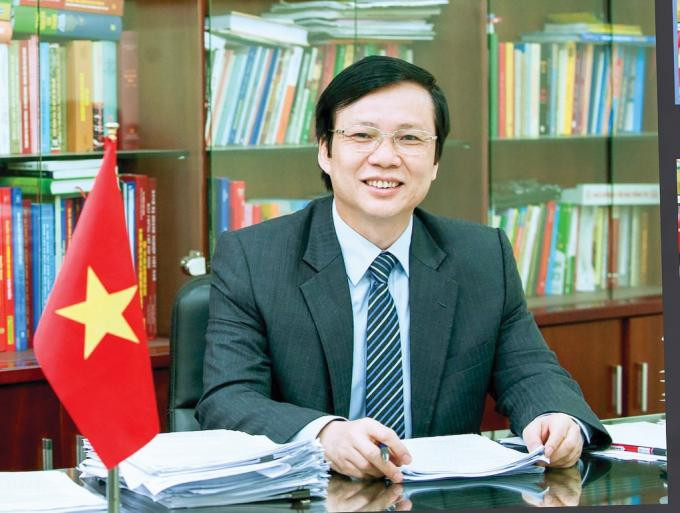 |
| Journalist Ho Quang Loi. |
We have also been to Kim Lien village of President Ho Chi Minh, Tien Dien village of Nguyen Du and Dong Thai village of Phan Dinh Phung and General Secretary Tran Phu, My Quan village, Dien Chau district of comrade Phung Chi Kien... suddenly discovered that it is as familiar as Quynh Doi village. The feng shui is also similar with green rice fields stretching to the misty mountains in the distance. And there, it seems that the hardship and poverty of the past still linger somewhere in the alleys and spaces of the integration period? Poet To Huu was very right and subtle when he wrote about Uncle Ho's Sen Village "The village is as familiar as the common homeland/ A few sour ponds, alum soil".
Ho Quang Loi's Quynh Doi Cultural Village was the same. The village was poor, his parents had many children, Ho Quang Loi was the third (born in 1956) of 6 siblings, in the time of high rice prices and low rice prices, everyone knew how hunger would be. His father was a tailor, his mother worked in the fields while the neighbors lacked fabric, few people made new clothes, except on Tet holidays, the fields were collectively farmed by the cooperative "beating the gong to go to work", the rice plants were small, the productivity was low, at only eight or nine years old, Ho Quang Loi had to help his mother early in the morning. As a small child, Ho Quang Loi went to collect firewood, raked dry pine needles for his mother to cook, each time he carried two ends of the poles filled with dry leaves, people could not see the person carrying them but only saw two poles of pine needles moving. And the mountain was not close, each time he went to collect firewood or rake pine needles like that, he had to go dozens of kilometers away. The happiest moment was when he reached the end of Beo village, his legs were so tired that he could no longer walk, then he saw his mother's figure from afar coming to pick him up, carrying him the last part of the way home. His thin shoulders and tiny feet had spent his entire childhood on dirt roads, dusty in the sun, muddy in the rain, and distant forests with deciduous pine trees. He said that sometimes, past noon and into the afternoon, he was so thirsty that he had to drink the rainwater that had collected in a bowl that the farm workers had tied to a tree to hold pine resin. The bowl of cool water, as he drank it, tasted better than the iced orange juice now.
Those miserable days began with a very painful and unexpected event that suddenly befell Ho Quang Loi's family. That was the story of his father, a talented and knowledgeable tailor, who suddenly passed away. That morning, Mr. Ho Quang Cac was working in the garden when he had a terrible stomachache. The village nurse came and injected him with a whole basket of medicine all day long, but he did not get better. Near evening, the family decided to move him to the district hospital. But at that moment, it started to rain heavily, and it never stopped. Knowing that he could not survive, his father told him to stay at home, that even if he went to the hospital, he would die on the way, even though a stretcher and hammock were prepared. A moment later, he breathed his last. At that time, the villagers suspected that his father might have cholera, and if he was not buried immediately, it would spread to many people (!). So everyone decided to take his father to the field right in the pouring rain. A funeral without a ceremony, without a memorial service, only a few relatives carrying the coffin in the rainy night was very sad. Later, experienced doctors said that maybe at that time his father had acute appendicitis, if discovered and operated on in time, he would have survived. Until now, more than 50 years later, that heavy feeling of sadness still lingers when the image of his father's coffin lying in a deep, waterlogged grave hastily dug in the sweet potato field in Dong Tuong field appeared in his mind, while his mother cried pitifully.
“...Where my father lay, the potato field was soaked with water
The sobs sink into the desolate, distant fields...”
Those are two sad verses in the poem “The Warmth of My Life” he wrote for his mother 30 years ago. Losing a father, the breadwinner of the family in the 60s of the last century, when American planes began to escalate bombing the North, was truly unimaginable for his mother and her young children, along with two old women, his grandmother and his aunt, who were over 80 years old. At that time, his mother had just given birth to her youngest sister 3 months ago. Very bewildered. As if to fill that boundless pain, Ho Quang Loi had to grow up quickly.
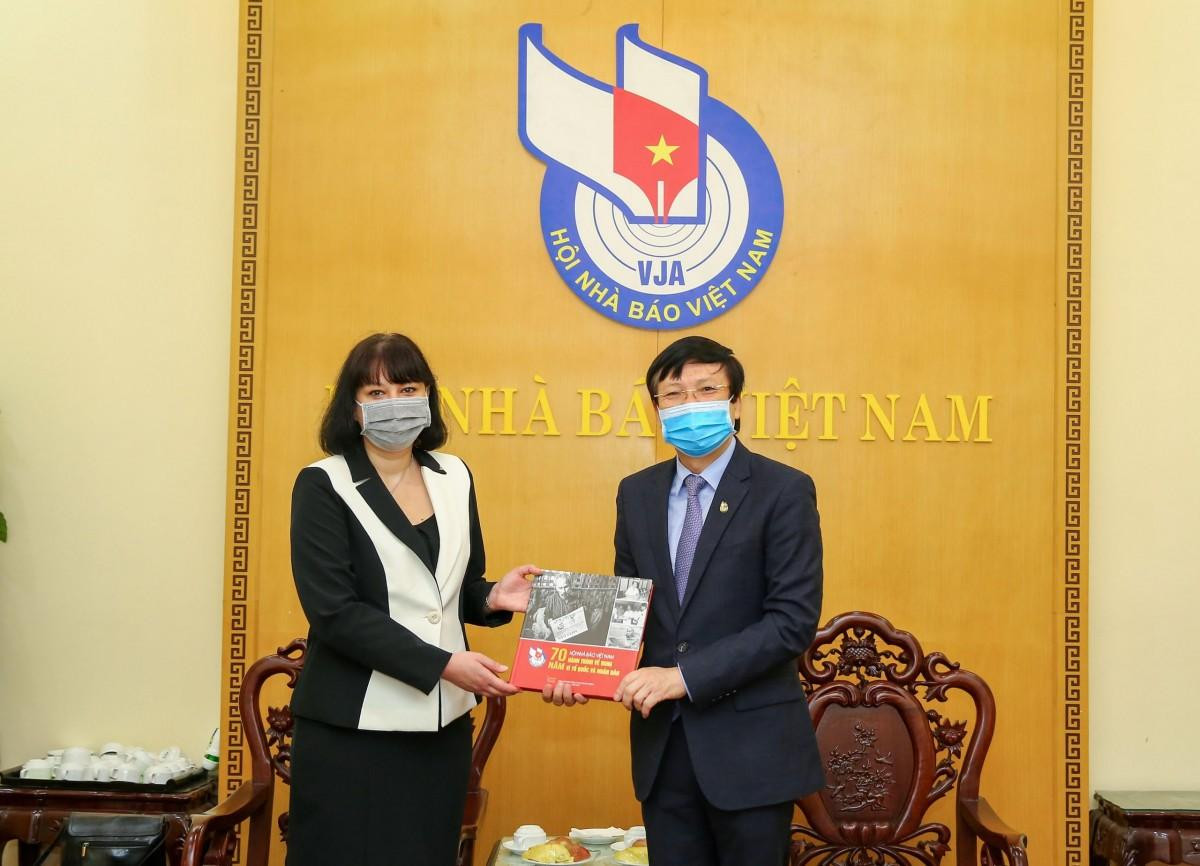 |
| Journalist Ho Quang Loi received the Romanian Ambassador. |
Ho Quang Loi did not drop out of school. His mother, Ho Thi Niem, told her children that no matter how poor they were, she would gradually raise them to study. If you love your mother, don't drop out of school. Ho Quang Thang's older brother volunteered to join the army, fought in the Laotian battlefield, and then spent years eating Northern food and fighting the Southern invaders. He loved his mother even more. His mother worked hard all year round, only knowing how to read and write through the popular education class, but she remembered folk songs and proverbs like a god, and she taught her children from a young age with sweet folk songs, she also wrote poems to teach them the good and right things in life. With the tradition of studiousness and academic achievements of the Ho Quynh Doi family, Ho Quang Loi was even more determined to excel. At that time, he was in grade 7 of the 10-year program and was always loved by teachers because he was good at all subjects, especially literature.
But how to help his mother ease her hardships was always on his mind. So Ho Quang Loi applied to join the plowing team of the production team. Plowing earned points for the cooperative to score work, and when harvest time came, each person would be counted for rice. Unfortunately, at that time, he was only 12 or 13 years old, very short, and could plow a buffalo, but he was not tall enough to carry a 51-meter plow or a harrow that was both wide and long. The field was far away, but the little student was exhausted just leading the buffalo and carrying the plow, let alone plowing the soil. Luckily, the plowing team knew this, so they assigned each other to carry the plow for him. After plowing, they sent someone to help him go down to the field with him to hold the buffalo, unhook the yoke, unhook the plow and carry it to the bank so he could plow the buffalo back. The plowing team supervised and showed him how to plow a straight line, where to start if he wanted to harrow quickly, and were very friendly and loving. The plowing team appreciated him not because he was a good scholar or a good student, but mainly because he was hardworking, bright, and quick-witted. It was rare for someone at that age to learn to plow as well as he did. Ho Quang Loi said that until now, he still clearly remembers the smell of mud and moss in the fields of different heights.
When telling me this story, Ho Quang Loi seemed to hold back his emotions about a time gone by, about the love of neighbors, relatives, and brothers among the farmers with muddy hands and feet. It was sympathy, love, respect for pens, ink, and words, and admiration for the hard work and diligence of students like Ho Quang Loi. Later, when he had left his homeland, traveled to the West and China, became famous, and lived in the thousand-year-old capital, but every time he returned home, he always took the time to visit his old farming ancestors. A pot of tea, a pack of cigarettes, a small gift, a book, he visited each person, the conversation was as happy as popcorn. Now, in that farming group, many people have passed away, the few remaining are over 90 years old, but they still recognize Uncle Loi, the old ancestor, when they meet again. Their arms hug tightly. Oh my, those friendly faces, eyes, the sound of the hooves following the buffalo, and the sound of turning the soil after plowing those days have always haunted me throughout my life!
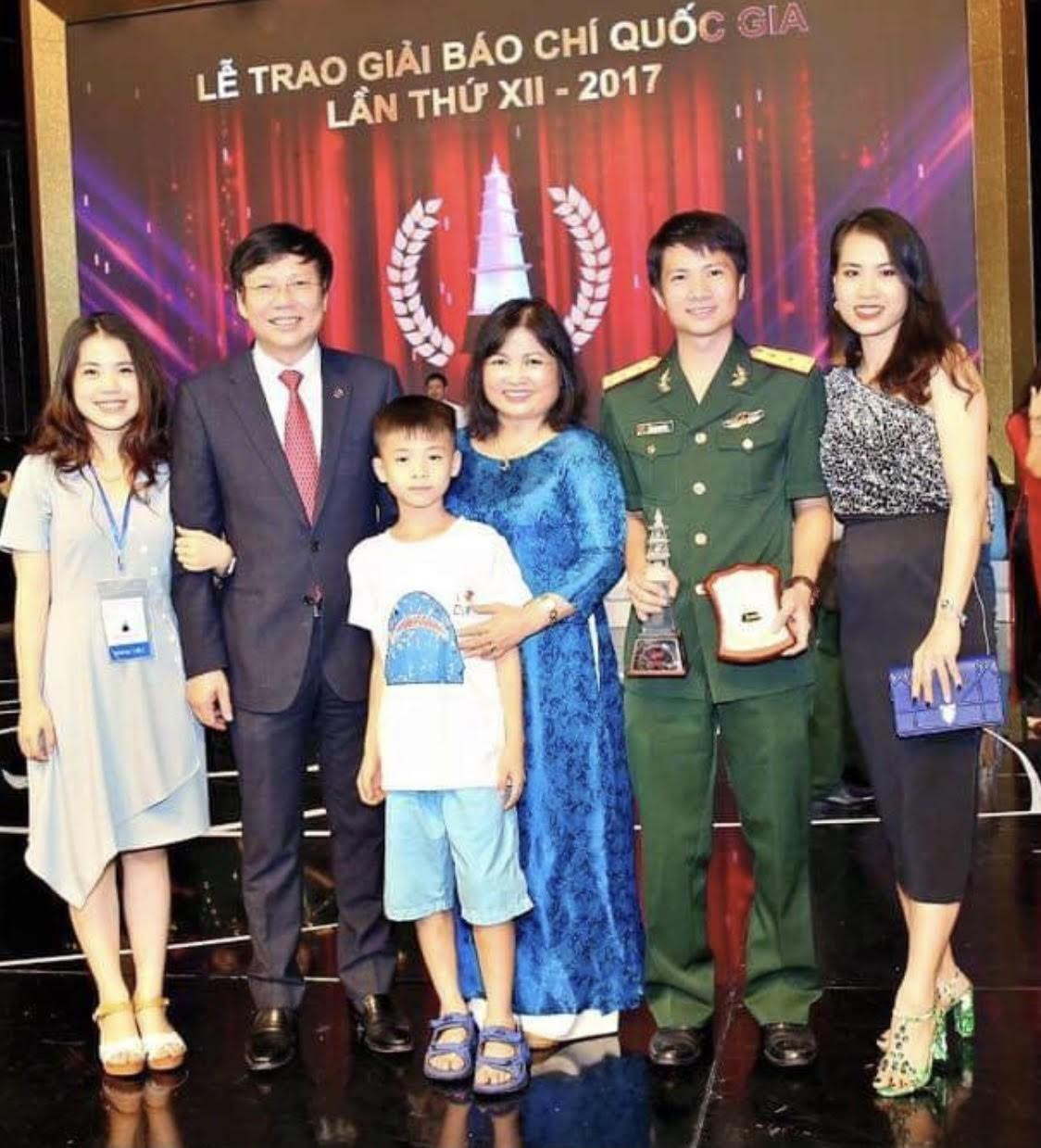 |
| Family of Journalist Ho Quang Loi |
It can be said that Ho Quang Loi's childhood and adolescence were very difficult and miserable when he was forced to become a real "old farmer" early. Along with plowing, sowing, planting rice, taking care of the rice, weeding, harvesting, drying, a closed cycle to bring the rice grains home, Ho Quang Loi had to do it all. He and his mother went to pull out the rice seedlings, plant rice with the cooperative members, doing the work so skillfully and quickly that the cooperative gave him a full day's work like other long-time farmers. It must be said that it was the dexterity and cleverness of a student who loved to work, studying and working really well to help his mother, not letting people look down on the children of farmers who did not know how to do farm work. Being skillful at work would earn him high points, and he would have rice when the harvest season came, which could be considered a great joy and happiness when he looked into his mother's proud eyes about his good children.
But Ho Quang Loi had another holy happiness, which was studying. Every night in the small house, his mother did not have to remind him when she saw her children each with an oil lamp, having to cover the light to avoid the American planes bombing at night, diligently studying. After dinner, such lamps were lit, the rustling sound of ink pens running on paper, the sound of turning pages of old textbooks signaled the vitality of the tradition of studiousness, predicting the future in this countryside. His mother worked while listening to the quiet sounds coming from each study table and would still be awake when her children turned off the lights to go to bed... It was not clear what to study for, but Ho Quang Loi was very passionate about books, the books and lectures of teachers entered his sleep, even during breaks between plowing and planting.
During the war years, American planes bombed and shelled the countryside of Nghe Tinh and the old Zone 4 provinces day and night. Places like Cau Giat, Hoang Mai Bridge, Bung Bridge, Cam Bridge, Cau Giat Station, Si Station, National Highway 1A, and the beach near his village became the coordinates of fierce bombing by American planes. But in the deep tunnel, the pages of books were still opened under the light of bean lamps. He studied at school and took advantage of the opportunity to study to improve his ability at the private home of his teacher, a person with the same surname Ho. Loving the good student who loved to study, both the teacher and his wife focused on teaching him with all their knowledge and experience of the teaching profession. It must be said that this was the seedling for Ho Quang Loi to take off. “I went to the homeroom teacher Ho Thi Thao to improve my writing skills, but her husband, Mr. Dinh Nho Hoan, a famous literature teacher in Nghe An province, directly guided me, inspired my emotions, and honed each sentence. Mr. Hoan's erudition, even now, at the age of over 90, still amazes me. To be honest, it was he who gave wings to my dreams and passion,” Ho Quang Loi once confided to me. The efforts of his teachers helped Ho Quang Loi's talent to begin to shine in the 7th grade, 1970. He achieved excellent scores in literature at the provincial level and was selected to be part of the Nghe An province team to compete in the literature competition for excellent students in the whole North.
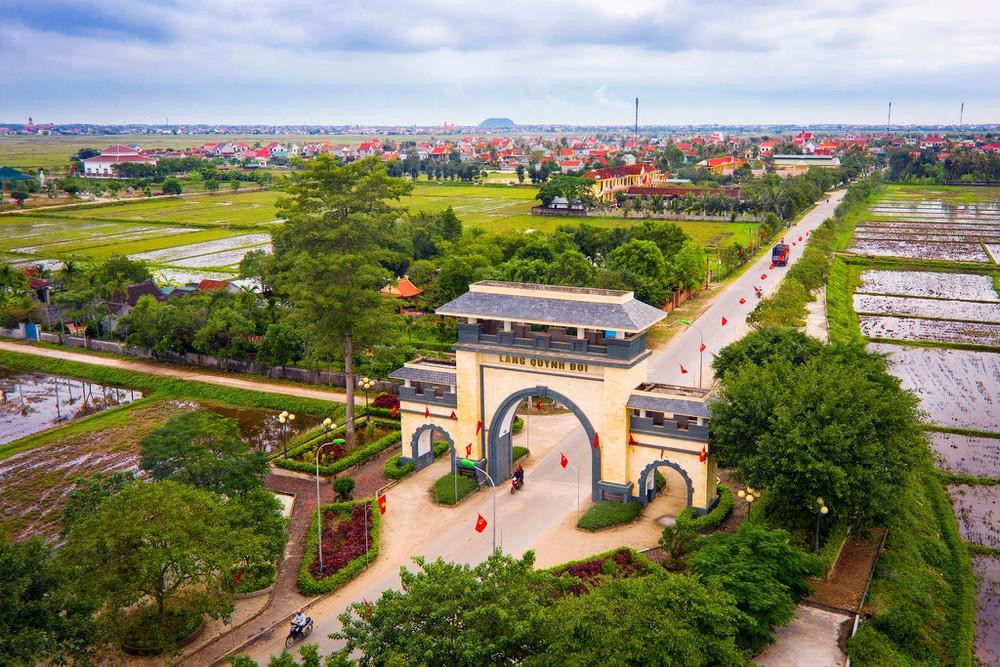 |
| The road to Quynh Doi village. Photo: Nhat Thanh |
Then Ho Quang Loi was admitted to the Nghe An Province Literature Class, the predecessor of the famous Phan Boi Chau Specialized School today. This was considered a joy for his entire village. For his mother Ho Thi Niem and his entire family, it was a dream come true. Although the notice from the Department of Education clearly stated that when coming to enroll, students must bring blankets, mosquito nets, lamps, mats, and school supplies - meaning they still had to be self-sufficient... but the great joy of "being fed and educated by the State" made his thatched house excited. Being fed by the province for the last 3 years of high school, he was not only happy because from now on his mother's family had one less mouth to feed (every year his family went hungry for 6-7 months), but importantly, it made the whole family and the whole countryside happy. Also, because of a poor family with many children and a father who died early, Ho Quang Loi strived to study well, reaching far and becoming an example for many students. For Ho Quang Loi, it was simply that from now on he could focus on studying as if he were going to the ocean. Holding the admission notice, his heart fluttered...
(To be continued)
Hanoi August 2021
>> Part 2: "Accumulation and diffusion"

